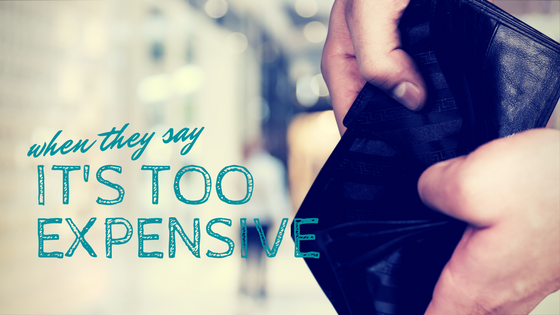Handling prospect objections is just part and parcel of making sales, but even some of the most experienced salespeople out there panic when a prospect cites price as being the reason they’re unlikely to buy.

You might find your first temptation is to offer a discount in order to close the sale, but is this really the best way to work? Interestingly, prospects who convert have on average 58% more objections than prospects that don’t, indicating you can view reluctance as a positive sign that your prospect is at the very least considering a purchase. Here’s our guidelines on handling cost objections effectively:
Is the cost objection a cover for something else?
Saying that a price is too high might feel easier to a prospect than admitting to the real problem. In truth, they might be concerned about something that’s less comfortable to talk about, like your lack of track record in their sector or their uncertainty about the product. Furthermore, some strategic prospects might be bluffing in order to begin negotiations for a reduced price. That’s why it’s important to make it known that you can’t be offended, and that you value their honesty. There’s no point in having an in-depth conversation about price when price isn’t really the issue!
What are their expectations?
In her book ‘Selling For Entrepreneurs’, Kathryn Lennon, founder of Tangerine Trees Business Consultancy, reminds us to differentiate between ‘not interested’ and ‘not what I was expecting’. When a prospect objects to the cost, it’s important to reflect on what their cost expectations were to begin with. Asking an open question will reveal what your prospect was hoping to spend. Do they mean you’re too expensive in comparison to a competitor? Have they had a cheaper offer? Are their expectations realistic? Finding out the answers to these questions gives you time and space to discuss the options again and convince your prospect that you are worth the money they’re being asked to spend.
Reiterate your value
You believe in what you’re selling. So if you start offering discounts and special offers as a knee jerk reaction to a cost objection, you might give off the impression that the value of your product is questionable. Remain grounded and reiterate the benefits of purchasing the product or service at the original price, what this can do for the business with an emphasis on how it’ll resolve certain pain points already mentioned by your prospect.
Follow Up
Following up to close a sale should be standard practice for any salesperson. But don’t forget to follow up after a price objection too, even if you’ve convinced them that the cost isn’t going to be an issue and you feel confident they’ll convert. Any meeting, whether it be on the phone or in person, should be finalised with a call to action with another meeting scheduled.
Remember, the number one reason a prospect will convert isn’t a low price but the confidence with which you sell. When a prospect says “that’s too expensive”, see it as an opportunity to emphasise the fact that you’d never sell them something they don’t need, or push something of questionable quality. If you believe in the value of your business and articulate this, costing objectives can be overcome through a simple conversation.
